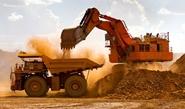Prices

March 15, 2016
Cliffs Natural Resources to Restart Minnesota Mine (WSJ)
Written by John Packard
The following article was originally produced by the Wall Street Journal on March 14, 2016.
The U.S.’s biggest iron ore miner Monday said it would restart a key mine in Minnesota, a positive sign for the battered U.S. steel industry following a small uptick in prices and new import tariffs on foreign steel.
Cleveland-based Cliffs Natural Resources Inc. said it would resume production of iron ore pellets at its Northshore operations, which employ 540 workers, by May 15.
The mine, which was idled in December, was one of many industrial facilities in the U.S. to fall prey last year to a painful downtown in the industrial commodities sector, driven by a slowdown in Chinese demand, a collapse of energy prices and the stronger dollar. Steel prices in the U.S. fell over 30% on the year. Big steelmakers laid off thousands of workers, closed plants and posted billions of dollars in losses.
“As our clients’ order books improve and their need for pellets approach more normal levels, we are pleased to announce that we are bringing back to work our dedicated employees at Northshore,” said Cliffs chief executive Lourenco Gonclaves.
The sector is getting some help. The U.S. this month announced new tariffs on imports of cold rolled steel, a basic form of the metal used to make appliances and shipping containers, from seven countries, including China. On Tuesday, the U.S. is due to announce another round of tariffs, this time on hot-rolled steel.
With new tariffs “being announced, the volume of unfairly traded steel is starting to subside,” said Mr. Goncalves. In January, U.S. iron and steel imports fell to 2.6 million tons, down 40.5% from a year earlier. Meanwhile, the benchmark hot-rolled coil index has risen 8.4% to $411 per ton since Jan. 1.
“The mills’ order books are improving,“ says John Packard of Steel Market Update. However, he adds, ”the real proof [of a recovery] will come when U.S. Steel and AK Steel restart” their large idled mills.
Under Mr. Goncalves, Cliffs has sold or shut down operations in Canada and the U.S. to focus on mining in Michigan and Minnesota, where the company has a geographical advantage selling to the Midwestern steel mills that supply the U.S. car industry.
Cliffs said it expects to produce 16 million tons of iron ore in the U.S. this year, at a cash cost of $50 to $55 per ton. The benchmark seaborne iron ore price is around $55 per ton, up 31% since Jan. 1. That means Cliffs, which sells its iron ore in contracts at undisclosed prices, should turn a profit. U.S. prices for iron ore are consistently higher because importing iron ore from Brazil or China, up the St. Lawrence seaway, can add as much as $40 per ton in shipping costs.
Write to John W. Miller at john.miller@wsj.com
SMU Note: Lourenco Goncalves, CEO of Cliffs Natural Resources will be a keynote speaker at our 6th Steel Summit Conference to be held in Atlanta, Georgia on August 29-31, 2016. Details can be found on our website or contact our offices at 800-432-3475 (info@SteelMarketUpdate.com).







